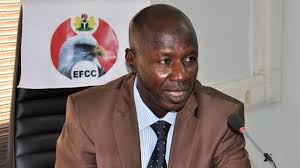When Will Nigeria’s Romance With Corruption End?
 |
| EFCC Chairman, Magu |
Nigeria has been romancing corruption for too long. Efforts
by successive administrations to end the romance have been unsuccessful,
because it seems as if Nigeria cannot survive without corruption. And it is a fallacy
to think or believe that Nigeria cannot survive without corruption. These days as
efforts are being made by President Muhammadu Buhari to reign in corrupt
politically exposed Nigerians and turn the economy around into a truly
productive one, where there are no free monies, the uninformed yelled, “Bring
back corruption!”
When you inquired why they want to bring back corruption
they reel out the prices of essential commodities when corruption was walking
on four legs in Nigeria and say that they are better off then, than now when
corruption is being tackled and billions of naira and dollars recovered from
looters.
It is perhaps ignorance of the enormity of the damage done
to this country by corruption that makes many Nigerians to be very tolerant of
the vice. It is also because corruption has been tolerated for a long time. Old
habits die hard. We need to be reminded how far this nation has gone with
corruption, for us to appreciate the urgent need to tackle it head-on.
In 1939, a Nigerian businessman based in Ghana named Prince
Eikeneh, wrote to the colonial government in Nigeria complaining about the
number of Nigerian girls who were coming to Ghana to work as sex workers. He
said the girls were usually taken there by a Warri-based Madam named, ‘Alice’
who told the girls they were going to learn a trade or get married. He
concluded that the trade was very well organized and profitable for the ringleaders.
Almost 80 years later there are still many Alices luring young Nigerian women
with non-existing jobs to Italy, UAE etc where they are forced to work as sex
workers like in 1939 that Prince Eikeneh complained about.
In 1947, late Chief Obamefi Awolowo wrote that “Corruption
is the greatest defect of the Native System.” He complained that not only did
judges take bribes; people used their connections to enrich themselves and
avoid punishment for their crimes. Several decades after Awolowo lamented that
judges take bribes, judges still take bribes if media reports are to be
believed. Today, corrupt people still use their connections to enrich
themselves and avoid punishment for their crimes.
In 1950, Abubakar Tafawa Balewa said, “The twin curses of
bribery and corruption pervade every rank and department of government.” At
that time ‘awoof’ was already being used to describe how civil servants used
their positions to enrich themselves. 68 years after Nigeria’s first and only
Prime Minister, Abubakar Tafawa Balewa observed that bribery and corruption
pervade every rank and department of government, are we any different today
even with the spirited efforts of President Muhammadu Buhari to turn the tide?
In 1968, a Polish-British Sociologist named Stanislav
Andreski coined the term ‘Kleptocracy’ to describe the system of government he
found in Nigeria. He said, “Nigeria is the most perfect example of kleptocracy
since power itself rests on the ability to bribe.” And as 2019 general
elections is around the corner, many political office seekers are set to bribe
their ways to power in apparent validation of Stanislav Andreski’s postulation
on corruption in Nigeria, 49 years ago.
An American businessman told the US Embassy in Paris in 1973
that “A great deal of the under the table payments were taking place in Nigeria
to obtain crude oil.” Today the names and criteria for awarding rights to lift
Nigeria’s crude oil are as opaque as in 1973. Given Buhari’s effort to sanitize
the sector, it is obvious that corruption in the oil sector is endemic,
institutional and pervasive.
In 1975, a report of the Judicial Commission of Inquiry into
the shortage of petroleum products found that a lot of the petrol being
imported into Nigeria was being smuggled to Chad and Niger Republic. Is this
excuse not familiar to observers of recent history of fuel shortages in
Nigeria?
In 1979, a British bank, Johnson Matthey collaborated with
the Central Bank of Nigeria to export huge amounts of forex from Nigeria on
behalf of politicians like Alhaji Umaru Dikko in contravention of foreign
exchange controls. The bank later collapsed due to unsecured loans to Nigeria
and had to be bailed out by the Bank of England with 100million Pounds- the
first time the Bank of England had ever rescued a private bank in British
history.
With corrupt acts in Nigeria leading to collapse of banks in
Britain and Brazil, any wonder Nigeria has become synonymous with corruption
among the international community. It is a narrative that Nigerians must
change. It is only those that are committed to the war against corruption that
can change this narrative, and should be supported by Nigerians in 2019 general
elections. That is the sure path towards ending Nigeria’s long romance with
corruption, which has pauperized its people and makes a mockery of its claim as
the ‘Giant of Africa’.

Comments
Post a Comment